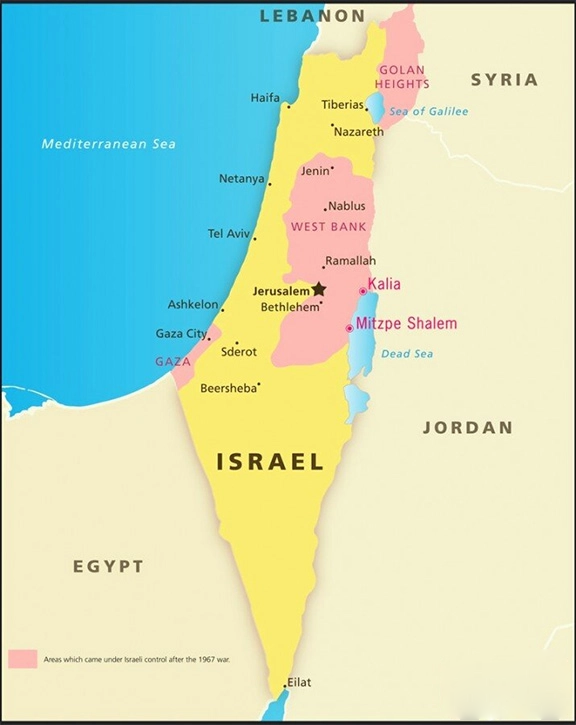International Relations
Ceasefire between Israel and Palestine
- 09 Aug 2022
- 7 min read
For Prelims: Geography of Israel & Palestine, Arab Israel war of 1948, Abraham Accord, Jerusalem’s al-Aqsa Mosque
For Mains: Israeli–Palestinian conflict, Arab Israel war of 1948, Six-Day War in 1967, Abraham Accord
Why in News?
After three days of violence between Israel and Palestine, which resulted in killing of dozens of populations in both the countries, a ceasefire took place recently.
- Earlier this year as well, tensions flared up at Jerusalem’s al-Aqsa Mosque between the Palestinians and Israeli police.
- These recurring clashes are part of the ongoing Israeli–Palestinian conflict.
What do we know about the Recent Conflict?
- Reason for Conflict:
- Actions from Israel:
- Israel launched its operation with a strike on a leader of the Islamic Jihad, and followed up on with another targeted strike on a second prominent leader.
- Actions from Gaza:
- As per the Israeli army, militants in Gaza fired about 580 rockets toward Israel.
- Israel had intercepted many of them, with two of those shot down being fired toward Jerusalem.
- UNSC Meeting:
- The U.N. Security Council scheduled an emergency meeting on the violence.
- China, which holds the council presidency for August 2022, scheduled the session in response to a request from the United Arab Emirates, which represents Arab nations on the council, as well as China, France, Ireland and Norway.
What is Conflict between Israel and Palestine?
- Conflict Over Jerusalem:
- Jerusalem has been at the center of the Israeli-Palestinian conflict.
- According to the original 1947 United Nations (UN) partition plan, Jerusalem was proposed to be an international city.
- However, in the first Arab Israel war of 1948, the Israelis captured the western half of the city, and Jordan took the eastern part, including the Old City that houses Haram al-Sharif.
- Following the Six-Day War in 1967, an armed conflict between Israel and a coalition of Arab states primarily comprising Jordan, Syria and Egypt, the Waqf Ministry of Jordan that had till then held control of the al-Aqsa Mosque, ceased to oversee the mosque.
- Israel captured East Jerusalem from Jordan in the Six-Day War 1967 and annexed it later.
- Since its annexation, Israel has expanded settlements in East Jerusalem.
- Israel sees the whole city as its “unified, eternal capital”, whereas the Palestinian leadership across the political spectrum have maintained that they would not accept any compromise formula for the future Palestinian state unless East Jerusalem is its capital.
- Recent Developments:
- Al-Aqsa Mosque & Sheikh Jarrah:
- In May 2021, Israeli armed forces attacked Al-Aqsa Mosque in the Haram esh-Sharif in Jerusalem, ahead of a march by Zionist nationalists commemorating Israel’s capture of the eastern half of the city in 1967.
- The threatened eviction of dozens of Palestinian families in the East Jerusalem neighborhood of Sheikh Jarrah escalated the crisis further.
- In May 2021, Israeli armed forces attacked Al-Aqsa Mosque in the Haram esh-Sharif in Jerusalem, ahead of a march by Zionist nationalists commemorating Israel’s capture of the eastern half of the city in 1967.
- West Bank Settlement:
- Israel's Supreme Court has rejected a petition against the eviction of more than 1,000 Palestinian inhabitants of a rural part of the occupied West Bank in an area which Israel has designated for military exercises.
- The judgment paved the way for the demolition of eight small villages in a rocky, arid area near Hebron known to Palestinians as Masafer Yatta and to Israelis as the South Hebron Hills.
- Israel's Supreme Court has rejected a petition against the eviction of more than 1,000 Palestinian inhabitants of a rural part of the occupied West Bank in an area which Israel has designated for military exercises.
- Al-Aqsa Mosque & Sheikh Jarrah:
- India’s Stand on the Crisis:
- India in the recent years has been following a dehyphenation policy between Israel and Palestine.
- India’s policy on the longest running conflict in the world has gone from being unequivocally pro-Palestine for the first four decades, to a tense balancing act with its three-decade-old friendly ties with Israel.
- In 2017, in an unprecedented move, India’s PM visited only Israel and not Palestine.
- Then, the recent visit of the Prime Minister to Palestine (2018), Oman and the UAE is again a continuation of similar policy.
- India in the recent years has been following a dehyphenation policy between Israel and Palestine.
UPSC Civil Services Examination, Previous Year Questions (PYQs)
Prelims
Q. Which one of the following countries of South-West Asia does not open out to the Mediterranean Sea? (2015)
(a) Syria
(b) Jordan
(c) Lebanon
(d) Israel
Ans: (b)
Explanation:
- The Mediterranean Sea borders 21 countries on three continents, i.e., Europe, Africa and Asia, which includes Spain, France, Monaco, Italy, Slovenia, Croatia, Bosnia and Herzegovina, Montenegro, Albania, Greece, Turkey, Syria, Lebanon, Israel, Egypt, Morocco, Algeria, Tunisia, Libya, Malta, and Cyprus.
- Jordan is landlocked, except at its southern extremity, where nearly 26 kilometres of shoreline along the Gulf of Aqaba provides access to the Red Sea.
- Therefore, option (b) is the correct answer.
Mains
Q. ‘Too little cash, too much politics, leaves UNESCO fighting for life.’ Discuss the statement in the light of US’ withdrawal and its accusation of the cultural body as being ‘anti-Israel bias’. (2019)
Q. “India’s relations with Israel have, of late, acquired a depth and diversity, which cannot be rolled back.” Discuss. (2018)







